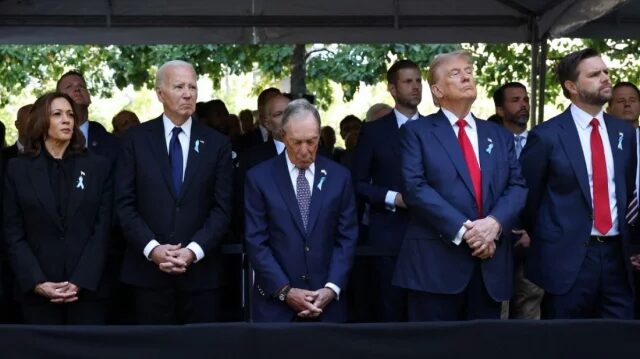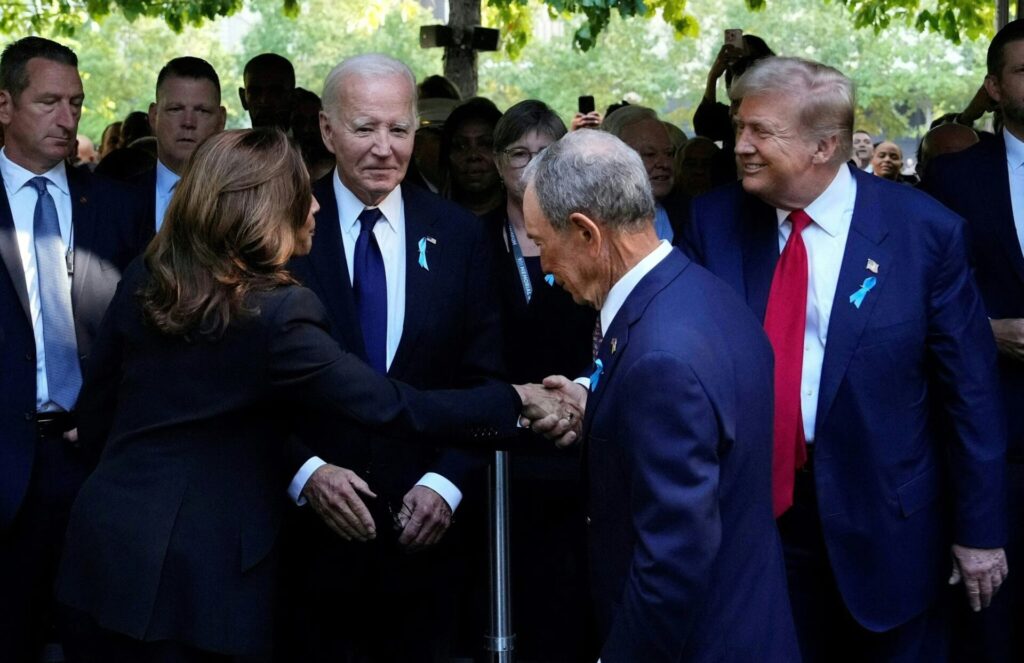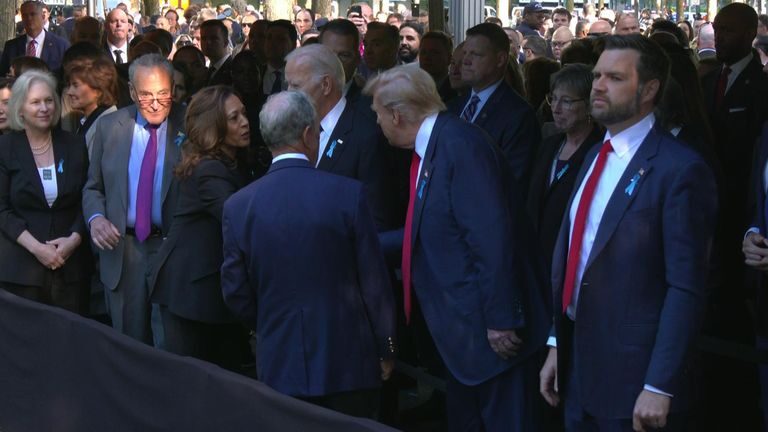
Families in mourning, officials from various levels of government, and emergency personnel convened in New York City on Wednesday to commemorate the 23rd anniversary of the September 11, 2001, terrorist attacks, which resulted in nearly 3,000 fatalities.
Kamala Harris and Donald Trump participated in the annual commemoration shortly after their intense presidential debate in Philadelphia on Tuesday evening.
The Democratic nominee for the upcoming presidential election in November, Harris, is now standing alongside Joe Biden, the President of the United States. This shift follows Biden’s decision to terminate his re-election campaign in July, subsequent to a notably unfavourable debate performance against Trump.
Biden and Harris commemorated the anniversary of the al-Qaeda attacks on the US with scheduled visits to the three locations where hijacked planes crashed in 2001: the World Trade Centre in New York, the Pentagon near Washington, DC, and a field in Pennsylvania.
Trump participated in the event in New York alongside his Republican counterpart, JD Vance. Prior to assuming their positions with gravity for the ceremony, Trump and Harris exchanged a handshake and restrained smiles.
The September 11 commemorations represent significant and solemn events, characterised by their nonpartisan nature. However, the dynamics of each election cycle introduce an element of tension to the proceedings. On Wednesday, considerable attention was directed towards Harris and Trump, with observers keen to analyse their interactions and behaviours.
On Tuesday night, Harris strategically crossed the stage prior to the debate’s commencement and extended her hand towards Trump, introducing herself as they had not previously encountered one another in person, compelling Trump to engage in a handshake.
Following the handshake at the memorial and a concise interaction between the two presidential candidates, Harris aligned herself to Biden’s right, with former New York mayor Michael Bloomberg situated between Biden and Trump, while Vance occupied the position to Trump’s left.

The current New York mayor, Eric Adams, was notably absent from that central group, as his administration is entangled in federal investigations.
Harris made her way to New York shortly after the majority of polling indicated her victory in the debate against the Republican presidential nominee in Philadelphia, with only eight weeks remaining until the presidential election on November 5.
No statements from political figures were planned at the World Trade Centre site in lower Manhattan, often referred to as Ground Zero, where family members recited the names of the deceased.
Biden and Harris subsequently arranged to travel to Shanksville, the site where passengers on United Flight 93 successfully thwarted the hijackers, resulting in the aircraft’s crash in a field and averting an additional target from being struck. Subsequently, they will return to the Washington area to assess the Pentagon memorial.
Approximately 3,000 fatalities occurred as a result of the attack, with over 2,750 casualties in New York, 184 at the Pentagon, and 40 in Shanksville; this total does not include the 13 terrorist hijackers, who also perished.
“Over the past 23 years, the families and 9/11 survivors have endured a tremendous emotional toll. We will consistently acknowledge and pay tribute to those who were taken from us prematurely,” stated White House press secretary Karine Jean-Pierre to reporters aboard Air Force One on Tuesday evening.
“We will implement all necessary measures to prevent a recurrence of such an incident,” she stated.
Biden released a proclamation recognising the individuals who lost their lives due to the attacks, along with the numerous Americans who subsequently enlisted in military service.
“We have an obligation to the patriots of the 9/11 generation that is impossible to quantify,” Biden stated, referencing the various deployments to Afghanistan, Iraq, and other conflict areas, alongside the capture and elimination of the September 11 architect, Osama bin Laden, and his associate.
On Tuesday, US congressional leaders awarded the congressional gold medal posthumously to 13 service members who lost their lives in the suicide bombing at Kabul’s airport on 26 August 2021, which occurred during the tumultuous US withdrawal from Afghanistan.

In New York, political tensions remained elevated despite the event’s designation as a non-partisan commemoration.
“You are in the presence of individuals experiencing a range of emotions, including grief, pride, and sadness, reflecting on the significance of that day and the impact these loved ones had on your life.” “It’s not political,” stated Melissa Tarasiewicz, who experienced the loss of her father, Allan Tarasiewicz, a firefighter in New York City.
Children and young adults who were born after the attacks that resulted in the loss of a parent, grandparent, aunt, or uncle are increasingly performing tributes in New York, along with the recitation of the deceased’s names.
“Although I never had the opportunity to meet you, I have a sense of familiarity that makes it feel as though I’ve known you for a lifetime,” Annabella Sanchez remarked last year regarding her grandfather, Edward Joseph Papa. “We will consistently acknowledge and pay tribute to you on a daily basis. “Our affection for you, Grandpa Eddie, is substantial.”
A significant sentiment increasingly resonates among those who have experienced the loss of loved ones: “I never got to meet you.”
This signifies a shift in generational dynamics. People in the younger generation who entered the world after strikes are able to articulate certain names. The previous year’s event included 28 individuals of that demographic among a total of over 140 participants. This year’s ceremony on Wednesday anticipated the presence of young individuals once more.
Some are offspring of victims whose partners were expecting. A greater proportion of the young readers are related to the victims as nieces, nephews, or grandchildren. They possess a collection of narratives and images and an inherent obligation of gravity.
The designation of a “9/11 family” has implications that extend across generations, and the task of commemorating and comprehending the September 11 attacks will eventually fall to a society devoid of direct experience of the events.
“It resembles the act of transferring responsibility,” states Allan Aldycki, 13. He analysed the names of his grandfather, Allan Tarasiewicz, along with several other individuals.